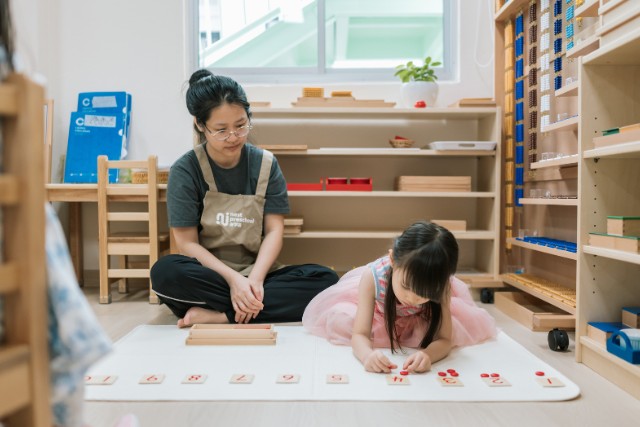Not many kids are thrilled about school. Mention the word ‘school’ to a group of children and it will likely elicit a chorus of sighs.

Here’s how you can help instill a positive attitude towards school for your children.
#1 Watch your words

Even before your children actually step foot into a school, how you portray school affects how they will view the whole schooling journey. Parents, be mindful of the words you use and the way you talk about school, teachers, homework and so on with your friends and with your kids. Little ears can be quick to form first impressions that would be hard to shake off later on.
Instead, wherever possible, do try to paint a positive picture of what their learning journey will be like. Encourage a growth mindset and the pursuit of knowledge, and be careful not to harp on things like future stress or homework at this stage. You’ll cross that bridge when you come to it.
#2 Don’t over-commit
One sure-fire way of turning your children off school is to cause them to be too exhausted to give school a proper fighting chance. Instead of packing your calendar with activities, intentionally keep school days as free as possible, so that children can complete homework or revisit lessons at their pace, and still have pockets of time for reading or free, unstructured play.
Keep enrichment classes to a minimum too. In order to truly enjoy school, your children needs the time and space to spend on relaxing, their hobbies or just chatting with Mum and Dad.
⇒ Related Read: Does My Child Really Need Enrichment Classes?
#3 Be on time

To a child, a short five minutes can make a world of difference. We all know that getting children ready for school is no mean feat, but it’s worth making that extra effort to be on time or even early on school days, because it allows them the time to settle in and be part of the group from the start. If the rest of the class has already begun a school activity when they arrive, children may feel like an outsider and hesitant about joining in right away.
Picking up your child on time is also a must, especially if your child is prone to worry about such things. Being the odd one out when their friends are happily greeting their loved ones at the end of the day can be very disconcerting and discouraging for young children. Too many late pick-ups may cause children to feel fearful about being abandoned and consequently affect their view of school.
#4 Trust the teachers

Initial days may be hard, as your child may be distraught about you leaving them in school. Rest assured that all early childhood education teachers are familiar with the strategies for dealing with a child’s separation anxieties. However, by hovering around to make sure that Junior is ok, you may be inadvertently preventing them from doing their job well.
⇒ Related Read: 9 Ways To Help Your Child Cope With Separation Anxiety
It may be difficult to just walk away, but parents need to do just that, trusting the teacher enough to leave your children in their hands. This allows them to begin to build new bonds with their teachers, setting the stage for a healthy relationship between teacher and student for the years to come. This also assures the child that Daddy and Mummy trust the teacher, so she can’t be a bad person.
#5 Team up with the teachers
No teacher likes a parent who is constantly breathing down her neck and checking on her every move. Instead of micro-managing your child’s educators, trust in their ability to teach. However, if you are concerned about your child for some reason, find an opportunity to discuss things with the teacher in a calm manner, seeking to find a solution for the problem at hand.
Keep teachers in the loop about significant happenings in the home, for example if your child’s pet or loved one passes away, or if your child is all smiles at school but weeping buckets at home.
⇒ Related Read: 10 Other Roles a Preschool Teacher Does Everyday Besides Teaching
#6 Get involved
If your schedule permits, helping out in school activities is one great way of helping your child know that you care about how he’s doing in school and want to be personally involved. There are lots of ways to get involved, for example chaperoning the children on field trips, leading workshops for the kids and teachers or participating in various kinds of school events.
Speak to the school administrator or teacher to explore how you can become part of your child’s world in school.
#7 Let them share about their day

In order to have handles on how to better support your child’s schooling journey, you need to have a good sense of what your child is experiencing in school on a daily basis. Find time, every day, to sit down with your child and talk about their day at school. Car or bus rides home are a good opportunity for such conversations, or over lunch at the dining table.
Some children may be bursting with things to share from the moment you pick them up from school and that’s great. But there will also be many who aren’t as forthcoming about sharing their day, and will need your undivided attention, patient listening and thoughtful, non-threatening questions to get them to open up more.
#8 Build and reinforce connections
Take what your child is learning at school and make it applicable to the home. For instance, if your child is learning about plants in school, a weekend trip to the Singapore Botanic Gardens will be a wonderful opportunity for them to study the various types of plants and possibly start to grow one of their own.
Such value-added activities can expand children’s views of what they are being taught in the classroom. Fan the flames that school is sparking in your child, and watch his curiosity and imagination take flight.

Besides building knowledge connections and experiences for your child, be mindful of social skills taught in the classroom and seek to reinforce them in the home. This encourages children to recognize that everything that they are gleaning from school is vital for home as well, and indeed, all of life.
Every child will face a unique set of challenges when he enters formal education, but a positive spirit can go a long way in helping them not just adapt to the circumstances, but also thrive.
By Dorothea Chow.
This is part of The New Age Parents “How To Raise A Child” series. Read other parts of the series here:
– How To Raise A Child Who Loves Nature
– How To Raise A Child Who Loves Drawing
– How To Raise A Child Who Loves Writing
– How To Raise A Child Who Loves Their Sibling
– How To Raise A Child Who Loves Learning
– How To Raise A Child Who Loves To Eat Nutritious Food
This article was first published in The New Age Parents e-magazine.
Enjoyed reading this or learned something new? Click the Like and Share button below!
Like what you read and want more? Receive our latest articles and giveaways when you sign up on our mailing list here.


























































